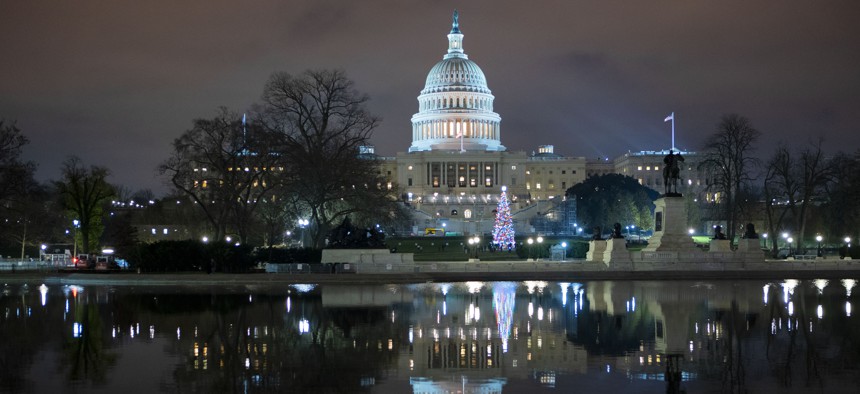Congressional Leaders Reach Deal on $900 Billion Covid Relief Package

The U.S. Capitol is seen at night after negotiators sealed a deal for COVID relief Sunday, Dec. 20, 2020, in Washington. AP Photo/Jose Luis Magana
The agreement reached Sunday does not include direct funding for state and local governments but does extend the amount of time they have to spend previously appropriated federal funds.
Congressional leaders announced an agreement Sunday on an approximately $900 billion coronavirus relief package, capping a weekend of tumultuous negotiations and teeing up votes as soon as Monday in the House and Senate.
Text of the legislation was still being drafted Sunday night, but lawmakers said it would include an 11-week extension of federal unemployment benefits, $600 direct payments to some Americans, and another round of grants to businesses through the Paycheck Protection Program. State and local governments would not receive direct aid through the legislation—rejecting the pleas of local lawmakers who say it is necessary to help with revenue shortfalls—but Democrats said some agreed-upon provisions would provide targeted funding that could offset expenses in specific areas, including schools, transit and healthcare.
The deal comes after negotiations stretched through the weekend and forced lawmakers to twice pass temporary legislation on Friday and again Sunday night to keep the federal government funded as talks continued.
"At long last, we have the bipartisan breakthrough the country has needed,” said Senate Majority Leader Mitch McConnell, announcing the deal on the Senate floor Sunday evening. “Now we need to promptly finalize text, avoid any last-minute obstacles, and cooperate to move this legislation through both chambers."
The agreement provides “some important new targeted funds for state and local government functions that will help alleviate their overall budget burdens,” said Senate Minority Leader Charles Schumer and House Speaker Nancy Pelosi in a joint statement. That funding includes $82 billion for colleges and schools; $27 billion for state highways, transit agencies, Amtrak and airports; and $22 billion for the health-related expenses.
The deal would also give state and local governments an additional year to spend the $139 billion appropriated under the CARES Act. In addition to asking for more money, local government leaders have also pleaded for more time to spend federal aid so that they could better prioritize spending.
Schumer said Democrats would continue to advocate for more financial aid for state and local governments once President-elect Joe Biden takes office next year.
“This agreement is far from perfect, but it will deliver emergency relief to a nation in the throes of a genuine emergency,” Schumer said.
If passed, the agreed-upon aid package will be the second most expensive federal stimulus in the history of the United States, following the $2 trillion CARES Act passed in March.
The agreed-upon deal would provide $300-a-week unemployment payments for 11 weeks—which supplement the aid people receive through state-run programs—as well as extend an unemployment benefits program set to expire at the end of this year that covers contract and gig workers. It also includes another round of direct payments of $600 per child and adult to Americans making under $75,000 a year.
The deal reups funding for the PPP and includes modifications to target funding to small and minority-owned businesses, non-profits, and independent-owned restaurants. It also includes $15 billion in dedicated funding for live venues, independent movie theaters, and cultural institutions, according to Schumer.
Other funding provisions include money for broadband, schools, vaccine distribution, and rental assistance.
Sunday’s announcement comes after a months-long stalemate between Democrats and Republicans over the provisions that should be included in the bill. Democrats initially sought a much larger aid package, while Republicans supported a more targeted initiative that included legal liability protections for businesses. Schumer said the package agreed to does not contain liability shields to restrict people’s ability to sue over coronavirus exposure.
A last-minute hang-up that had threatened to derail the bill was a demand by Sen. Pat Toomey, a Pennsylvania Republican, concerning the Federal Reserve’s lending programs for businesses and local governments. Lawmakers worked out a compromise on that provision.
Andrea Noble is a staff correspondent with Route Fifty.
NEXT STORY: Congress Nears Covid-19 Relief Deal With Direct Stimulus Payments, But No Local Government Aid





